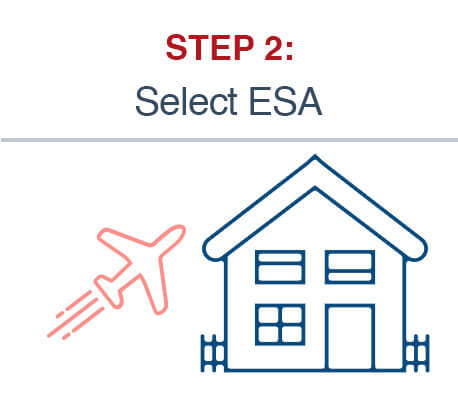There is a clear distinction between pets, service animals, and emotional support animals, and each type of assistance animal and their handlers are governed by a specific set of laws. ESA laws focus solely on emotional support animals (and their owners).
An Emotional Support Animal (ESA), also referred to as a support animal or assistance animal, is a designated companion animal that provides a specific benefit to a person dealing with a mental, emotional, or psychological disability or condition. In order for your animal to be officially considered an ESA, a licensed mental health professional or doctor must provide the proper documentation. The most common type of emotional support animal is a dog, but ESAs can also be cats or other types of animals.
An emotional support animal is different from a service animal, both in definition and the way it is viewed under varying rules and regulations.
If you have an emotional support animal, you have certain rights that are protected by the ESA laws. These rights extend to housing related situations and are intended to provide for the fair and lawful treatment of anyone that’s received the proper designation for an emotional support animal.
Laws on emotional support animals also referred to as the ESA Laws, outline specific regulations applying to housing.
The first area that is covered by the ESA laws is housing and addresses how emotional support animals are considered under the Fair Housing Act. According to this portion of the ESA laws, your landlord, owner, or building manager is required to make reasonable accommodations to allow your emotional support animal, regardless of a “no pets” housing policy.
Any pet can qualify to become an emotional support animal, specifically if the pet provides comfort and emotional support to a person with disabilities. If your pet currently supports you in the management or emotional, psychological, or mental disabilities, they can become your emotional support animal. There is no specific training or certification required for an emotional support animal, but your pet should possess the ability to function well around other people and animals.
If you’re interested in officially designating your pet as an emotional support animal, you will need an Emotional Support Animal (ESA) Letter.
An Emotional Support Animal (ESA) Letter is provided by a licensed mental health professional, stating why you require an emotional support animal. Typically, anyone with a qualifying and diagnosed mental, psychological, or emotional condition can obtain an Emotional Support Animal (ESA) Letter if a licensed mental health professional sees fit.
Here are just a few examples of conditions that may qualify you for an emotional support animal:
An Emotional Support Animal (ESA) Letter must be printed on your therapist’s official letterhead, stating that you suffer from a specific emotional disability (as included in the Americans with Disabilities Act). The letter must also explain that your emotional support animal is key to your wellbeing. Finally, the letter is required to be signed and dated by your licensed therapist, as well as include their license number, and the date and place it was issued. An Emotional Support Animal (ESA) Letter is only valid for one year from the issued date.
In some cases, you may be asked to provide an Emotional Support Letter that includes specific wording and information, such as the breed of your ESA, the weight of your ESA, and certain language applying to your needs.
No. You are not required to register your emotional support animal in any database or system. While there are many online services that advertise ESA registration, there is no official requirement or government database. Your ESA Letter is the only primary documentation needed.
No. Your emotional support animal is not required to wear an ESA vest, uniform, harness, or identification card. However, you may find it helpful to have something to identify your emotional support animal whenever you’re planning to bring them to a public place. Having some form of documentation to prove they are an emotional support animal can help you avoid conflict and hassle in the event that their status is questioned.
While there are no laws prohibiting two (or more) emotional support animals, the requirements for each animal do not change. A licensed mental health professional must provide recommendations for each of the emotional support animals, and each animal should have the proper supporting documents. It is important that both emotional support animals are properly trained to function in the public space, and that you are able to provide sufficient care and attention to all ESA.
If you are interested in ESA Letters for more than one animal, it’s important to understand that a licensed mental health provider must agree that there is a valid reason that multiple ESAs are necessary for your health and wellbeing.
Provided below are additional details regarding specific scenarios, questions, and concerns you may encounter as the owner of an emotional support animal. Understanding specific regulations applying to emotional support animals is an excellent way to prepare yourself for various situations and assert your legal rights if needed.
The Fair Housing Act (FHA) prohibits discrimination in housing, including that related to disability, race, religion, color, national origin, sex, and familial status. Anyone seeking to rent or buy a home, get a mortgage, or receive housing assistance is protected under the FHA. There are additional protections that apply specifically to federally-assisted housing.
The FHA also prohibits a landlord or owner to set different terms, conditions, or privileges for the rental or sale or home based on any of the reasons listed above. Different rental prices or sale prices based on discriminatory factors is also banned, as is the failure to provide proper maintenance, harassment, or the limiting of privileges or services offered to other residents.
In very specific circumstances, the following types of housing may be exempt from the FHA: owner-occupied buildings with four or fewer units, single-family houses rented or sold by owner (without an agent), private clubs that limit occupancy to members only, and housing managed by religious organizations.
According to the HUD, a housing provider must consider the two following questions when considering a request for an ESA:
1. Does the person seeking accommodations have a disability?
2. Does the person seeking accommodations have a disability-related need for the emotional service animal?
If one of the above questions can be answered with a “no,” then the housing provider does not have to make reasonable accommodations. If both questions can be answered affirmatively, then the housing provider must attempt to accommodate the ESA and its owner.
Under the Fair Housing Act (FHA), landlords must make an effort to reasonably accommodate your emotional support animal, even if the property has a “no pets” policy. However, reasonable accommodation can be denied in certain situations. For example, it allows your emotional support animal would place an undue administrative or financial burden on your housing provider, they are allowed to deny your request. Or, if you have a particularly large emotional support animal, such as a llama or horse, you may be denied housing as well.
If your emotional support animal is disruptive in any way and is determined to be detrimental to the health, safety, or property of other tenants, the landlord may have grounds to refuse housing. Restrictions that normally apply to pets living on a property, such as pet fees or breed restrictions, cannot be applied to emotional support animals. Each emotional support animal request but be evaluated on a case-by-case basis, depending on the situation and animal in question.
You should know that while your landlord is allowed to request for ESA documentation, he or she is not permitted to ask for your personal medical details, records, or other extensive information.
HUD regulations specifically stipulate that landlords cannot charge extra fees to tenants with any type of assistance animal, including emotional support animals. However, keep in mind that you may be liable for expenses incurred from damages caused by your emotional support animal.
Usually, communicating openly with your prospective landlord about your ESA is the best course of action. Providing advance notice allows them to determine if a reasonable accommodation is possible. Also, in the case that a landlord provides a valid denial of your ESA request, you will be able to seek other housing with ample time.
However, you are not required by law to disclose your ESA during the housing application process, so the decision is ultimately up to you. If you choose not to discuss your ESA during the application process, you will then need to provide your ESA documentation after your have been accepted. At that point, if you are denied, you can take further steps such as requesting additional information about the denial or filing a complaint with the HUD.
Many colleges and universities have specific policies addressing the use of emotional support and other assistance animals in housing facilities. Recent court cases have required college campuses with “no pets” policies to make reasonable accommodations for ESAs, stating that on-campus housing at public universities is covered by the Fair Housing Act. However, there is still some uncertainty regarding ESAs and private, on-campus housing, so it’s best to contact your educational facility ahead of time to gather information.
If you believe you are the victim of housing-related discrimination resulting from your ESA request, you can file a complaint with the HUD using their online filing process. You can also print and mail a HUD Discrimination Form, or file a complaint with the specific agency in your state.
ESA approval animals that are well behaved are typically allowed on trains and buses with flexibility. However, trains and buses are not required to allow emotional support animals. We suggest calling the company in advance to ask about their pet policy.
Emotional Support Animal Laws do not apply to hotels, so there are no requirements that your emotional support animal be accommodated. However, the likelihood that you are allowed in the hotel with your emotional support animal are increased drastically with the proper documentation from a healthcare professional or doctor. We suggest you can call ahead to inquire about your hotel’s pet policy. Many hotels allow guests to bring pets into their hotel room, though some may require an additional fee or deposit. Of course, if your emotional support animal damages hotel property in any way, you are liable.
ESA Laws do not state that restaurants must allow emotional support animals. It is not unusual for restaurants to prohibit animals, due to food safety regulations. However, you may want to call the restaurant to find out if there is any way to accommodate your emotional support animal

Use our quick and easy Free Online Pre-Qualifying Tool by clicking here

Choose an ESA letter and checkout to place an order

Fill out a questionnaire for the doctor. They will email your approved ESA.
© 2025 - Support Pets - All rights reserved